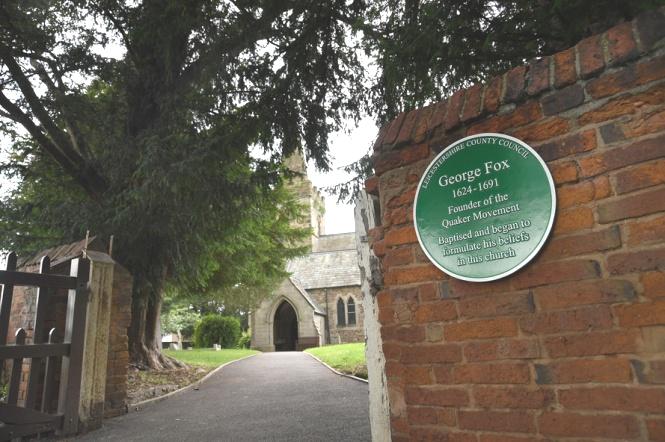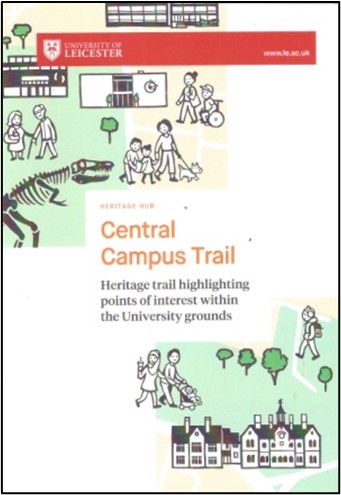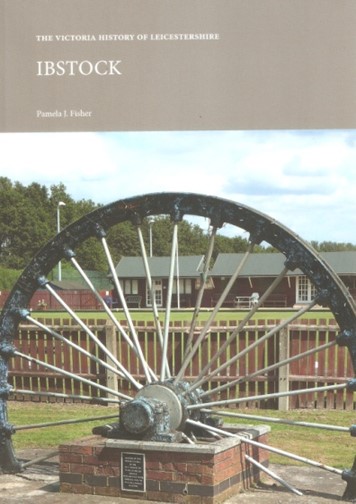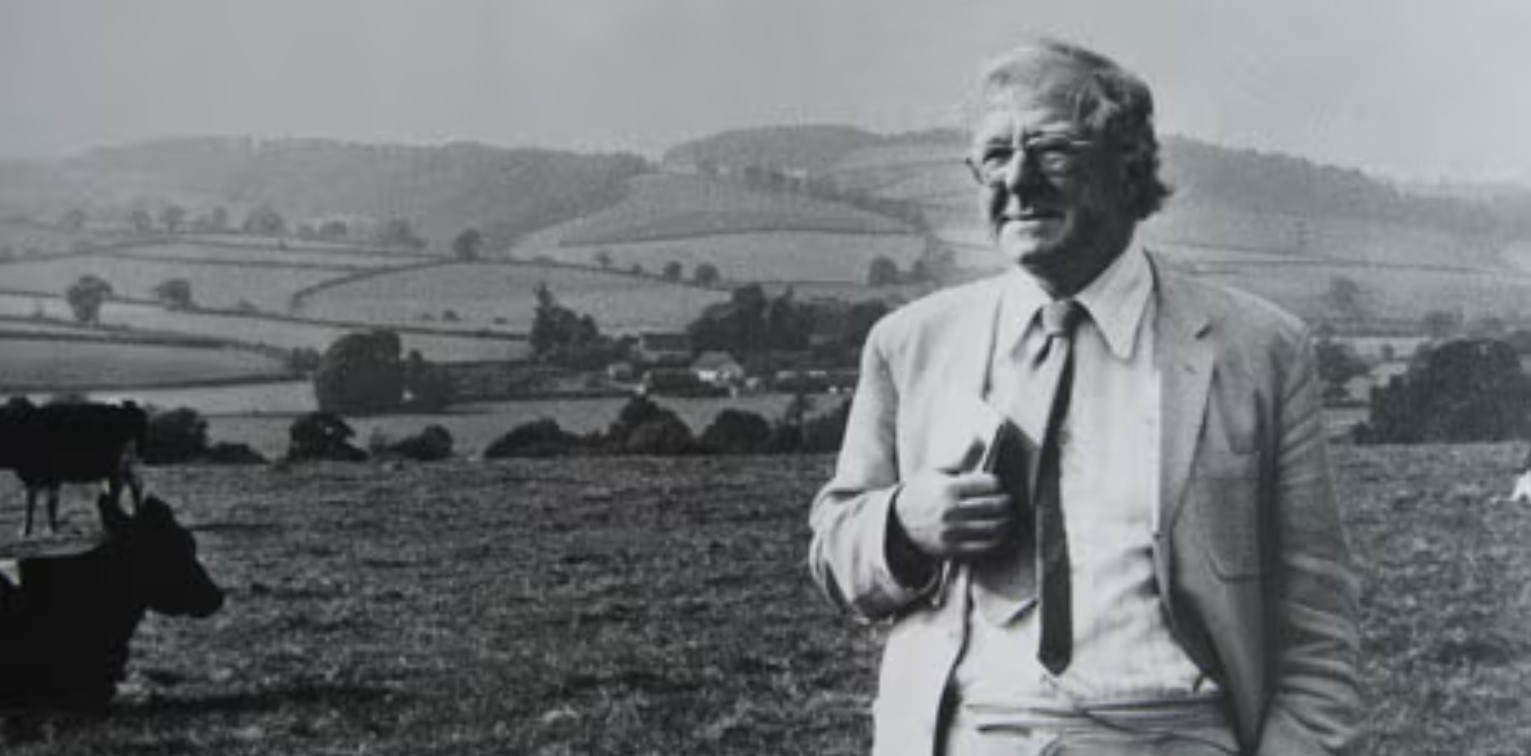Issue number 120
Newsletter Autumn 2023
Autumn 2023 Newsletter, edited by Cynthia Brown and prepared for web by Matthew Beamish.

LAHS dissertation prizes
We are very pleased to announce the first winners of the LAHS prizes for dissertations, as follows:
- BA Archaeology: Jonathan Walsh, The clay tobacco pipes of Bradgate House: Leicestershire social dynamics, trade, and consumption patterns in an elite household (University of Leicester, 2022)
- BA History: Lynn Marriott, Local Responses to the Reformations – a case study of Melton Mowbray (Nottingham Trent University, 2022)
- MA History: Denise Greany, ‘We Did Not Go’: domestic sociability in an early 19th century Provincial Town (University of Leicester, 2022)
Each winner has been awarded £250 and membership of LAHS for one year. They will also have an opportunity to publish some of their work in the Leicestershire Historian, and present it at the annual Members’ Evening. Guidelines for future dissertation prizes can be found at LAHS Dissertation Prizes 2024. We would like to thank Professor Elizabeth Tingle for all her work organising the competition and convening the prize committee.
News from the library
As autumn approaches, a reminder that the Library will close on Sunday 15 October and should reopen on Sunday 4 February 2024. Publications of interest and relevance continue to be added to the Library despite the lack of shelf space. As always, the Society is grateful for the kind and thoughtful generosity of donors.
Books and Pamphlets
- ADAM, R., CAMBERS, C., LIDIKER, P., & NEWMAN, A. Sharing our heritage. Leicester Hebrew Congregation, 2022. Donated by Rosalind Adam.
- AUSTIN, F. Syston in the 20th century. Book 2: Syston at work and play. Syston Local History Group, 2022.
- CHAPELS SOCIETY JOURNAL Vol. 4 2023 Communities of dissent 1850-1914. 5 articles, including Earnest spirituality, a winning presence, a curiously fascinating personality: the life and work of Revd. Gertrude von Petzold [Leicester], by Cynthia Brown. The List of Community Profile Reports has 3 Leicestershire items. Donated by Cynthia Brown.
- DAVICE, B. Who stole the common from off the goose: a new social history of Oadby village from 1700-1911: rediscovering the history of Oadby’s erased yards and the poor who lived there. The author, 2022. Donated by B. Davice.
- GREATER WIGSTON HISTORICAL SOCIETY Wigston and district window on the past. Vol. 1 (2020) – Vol. 5 (2022). Complete file donated by Steve Marquis.
- HARTLEY, R. Medieval earthworks of Rutland. (Leicestershire Fieldworkers Monograph No. 5). 2023. The volume is dedicated to Tony Squires 1940-2021.
- Highfields remembered. Leicestershire Multicultural Archive Project, 1996. Donated by C. Brown.
- JENKINS, J. Nursing in Serbia with Lady Paget in 1915: the adventures of Flora Scott of Leicester. Lookout Press, 2022.
- JENKINS, R. The Base Hospital: an account of the 5th Northern General Hospital R.A.M.C.(T) and its satellites during the Great War. Lookout Press, 2022. Both donated by the authors. See www.heritageco.co.uk.
- JONES, I. & KENNEDY, J. Legal Leicester: the streets and voices of Greyfriars. The authors, 2022. Donated by Iain Jones.
- LEICESTERSHIRE INDUSTRIAL HISTORY SOCIETY Bulletin 25. 2023. Social impact of the Leicester and Swannington Railway, one of England’s early locomotive powered railways, by J. Buss; adapted by D. Pearce. Donated by Chris Hossack, LIHS
- MATTHEWS, J. & FOLEY, M. Gopsall: a millennium of influence. 2021.
- MATTHEWS, J. & STONEY, L. Gopsall & Congerstone at war. 2020.
- SMITH, J. ed. Stukeley and Stamford part II: tribulations of an antiquarian clergyman 1730-1738. (Lincoln Record Society Vol. 111) 2023. [Part I ed. D. & M. Honeybone LRS Vol. 109 2021].
- UNIVERSITY OF LEICESTER Central campus trail. [2023].
- WESSEL, C. Beaumanor WWII: secret listening station for Bletchley. The author, 2022. Donated by Caroline Wessel.
Periodicals
- British Archaeology 7-8/2023 includes mention of Rosemary Cramp and a photo of Jim Butler.
- Hinckley Historian 91 Summer 2023 Coronation Special Edition. Extensive illustrations. Donated by Hinckley and District Museum.
- Journal of Historic Buildings & Places Vol.2 2023 includes Balcony or pergola in England in the 17th century: a history and gazetteer (records four in Leicestershire and Rutland).
- Interesting catalogues continue to be received from the local Cottage Books, the most recent being June and August.
Enquiry
An unusual query was left at the Guildhall from a non-member of L.A.H.S. who was looking for records of unsolved crimes in Leicestershire around 1911-1913. The only information was “Thomas Hall” as the possible perpetrator, who departed the scene leaving a wife and family behind, saying “ask no questions”. So, basically, unknown crime, unknown date, unknown place. Answers on a postcard, please!!!
Aubrey Stevenson, Hon. Librarian.
LAHS Public Heritage Fund
2023 has been a busy year so far for the LAHS Public Heritage Fund, and it is great to see so many local heritage organisations picking up activities in earnest following the pandemic disruption. We awarded the Greater Wigston Historical Society a grant towards the purchase of an interactive Smart Board for its Heritage Centre on the campus of Wigston Academy Trust, to enable easier engagement with the collections by their visitors, volunteers and local school children. The collections cover family history, local history and heritage, and include over 15,000 digital images, audio recordings, original documents, maps, and the Duncan Lucas Historical Archive. Further details can be found at www.wigstonhistoricalsociety.co.uk.
Our most recent grant went to Hallaton Museum as part of its crowdfunding towards a refresh of the Hare Pie Scramble and Bottle Kicking exhibition. The Museum is continuing to ask for donations for the remaining £1000 required. To make a donation, visit www.justgiving.com/crowdfunding/Hallaton-museum, or make a payment via BACS to Hallaton Museum: Sort: 40-32-04 Account No: 3154850. All donations will go directly to funding this new permanent display. For information on how to apply to the Public Heritage Fund, visit www.le.ac.uk/lahs/downloads/Grants/LAHS_PHFund_Guidance_20220926.pdf or email phfund@lahs.org.uk.
Other news
Green Plaques – Leicestershire County CouncilL
Leicestershire County Council’s Green Plaque scheme has now closed after six rounds of awards marking people and sites of historical significance. The final plaque honours George Fox, founder of the Quaker movement, and was unveiled in Fenny Drayton in June 2023. For a full list of Green Plaques, along with images, go to Green Plaques unveiled across Leicestershire.

Leicester honour for Dr Richard Buckley OBE
Former LAHS chair Richard Buckley, director of the University of Leicester’s Archaeological Service during the excavation which led to the discovery of the grave of Richard III, has recently received a City of Leicester Award. This recognises excellence in his field of work and the international acclaim which this helped to bring to the city of Leicester. For more information, visit City of Leicester Awards for three leading academics.
Charnwood Museum – Loughborough Landmarks Exhibition
Loughborough's War Memorial, the Carillon Tower, is celebrating 100 years since its construction and official opening on 22 July 1923. To mark the centenary year, the ‘Loughborough Landmarks’ this exhibition looks at the most iconic buildings and landmarks of Loughborough as voted for by the public, including objects linked to the Carillon, Taylor’s Bell Foundry and Rosebery School. The exhibition is free and can be viewed during normal opening hours until December 2023. For further information, visit www.charnwoodmuseum.co.uk.
Heritage Hub – University of Leicester
The University of Leicester has recently established a Heritage Hub which aims to work creatively with communities in Leicester, Leicestershire, Rutland and beyond. It has recently published a trail around the University’s central campus, highlighting points of interest within the grounds. This takes in the original College House (1872) and the former County Lunatic Asylum (1837), now the Fielding Johnson Building, and those forming part of the major post-World War II expansion. It also covers more recent additions such as the state-of-the-art medical building, the George Davis Centre (2016), and the Residential Towers (2019 – 2022, named after people with close links to the University – among them Dr Heather Couper CBE, broadcaster on astronomy who studied astrophysics at the University in the 1970s. The trail can be downloaded at Heritage Hub: Central Campus Trail (le.ac.uk). For further information about the Heritage Hub, email heritageuol@le.ac.uk.

Archaeology
ULAS is currently carrying out excavations in Lincolnshire and Nottinghamshire, but will be starting a site in Sileby and Laughton in September. There will be an update on this in the December 2023 Newsletter. In the meantime, you might like to revisit Mathew Morris asking the question ‘Is Leicester the most excavated city in Britain’ on YouTube in 2021 - The archaeology of Leicester: The most excavated city in Britain? - Bing video.
Forthcoming events
Heritage Open Days, 8 - 17 September 2023
Local events for this year’s Heritage Open Days in Leicester and Leicestershire include a walking tour of Burbage, ‘100 years of Holy Apostles church’ in Leicester, and a guided tour of the recently restored Kibworth Windmill, the oldest windmill in Leicestershire. Go to Search events | Heritage Open Days for details of all 49 events.
Friends of Charnwood Museum
20 September 2023
Leicester Cathedral
Rebecca Hale, Leicester Cathedral
The history of the cathedral, including archaeological discoveries during the recent Leicester Cathedral Revealed excavations - https://charnwoodcouncil.bookinglive.com/friends-of-charnwood-museum/leicester-cathedral.
18 October 2023
Mountsorrel Railway and Quarry
Mark Temple
The history and development of the railway and quarry in Mountsorrel, and its ecological and historical legacies - https://charnwoodcouncil.bookinglive.com/friends-of-charnwood-museum/mountsorrel-railway-and-quarry.
15 November 2023
Letters to Santa
Gillian Pritchard, Loughborough Library volunteer
The history of letters to Santa with an unexpected twist! More details and bookings at https://charnwoodcouncil.bookinglive.com/friends-of-charnwood-museum/letters-to-santa. All talks are held at Charnwood Museum, Queen’s Park, Loughborough, LE11 3DU and start at 7.30 pm. £4 for non-members; £2 members. Follow the link for more details and bookings.
Greater Wigston Historical Society
Meetings are held on Tuesdays at 7.15 pm at the Menphys Hub, Bassett Street, South Wigston, LE18 4PE. Doors open at 6.45 pm.
19 September 2023
William Brown – “Peppermint Billy”
Jo Mungovin
17 October 2023
The Musical Venues of Leicester
Neil Crutchley
21 November 2023
Christmas Customs
Virginia Wright
Guided cemetery tours
Guided tours commemorating the dead of both World Wars, led by Neil Strange, will be available as follows. Visit www.cwgc.org/tours to book a free ticket.
Sunday 1 October and Saturday 4 November 2023, 2 pm
Belgrave Cemetery, Leicester
Starting from the Centre Parking Area.
Sunday 1 October and Saturday 4 November 2023, 10.30 am
Gilroes Cemetery, Leicester
Starting from the Cross of Sacrifice.
Sunday 24 September, 22 October and 5 November, 10.30 am
Loughborough Cemetery (London Road)
Starting from the CWGC Plot.
Leicester Civic Society
Saturday 16 September 2023
“See to it that their names be not forgotten”
Secular Hall, Humberstone Gate, Leicester LE1 1WB at 10.30 am as part of Leicester’s Heritage Open Days festival. A presentation on the work of the Leicester City, County & Rutland At Risk War Memorials Project by Dennis Kenyon, one of the project directors. Drop in - booking not required.
Leicester Secular Society
Sunday 17 September 2023
Leicester’s Co-operative Commonwealth
Ned Newitt
Secular Hall, Humberstone Gate, Leicester, LE1 1WB, 6.30 pm
Leicestershire and Rutland Family History Society (LRFHS) – Leicester Group
For further information see LRFHS - Meetings, which also has details of meetings of the Hinckley, Loughborough, Market Harborough and Rutland groups.
Wednesday 13 September 2023
Leicester’s Slums
Ned Newitt
Stoneygate Baptist Church, London Road, Leicester, LE2 3ND, 7.30 pm. Doors open 7 pm.
Wednesday 11 October 2023
Famous Leicester City Players with Local Family Histories
John Hutchinson
Oadby Granville Tennis Club, Leicester Road, Oadby, LE2 4AB, 7.30 pm. Doors open 7 pm.
Wednesday 8 November 2023
Welford Road Cemetery and WWI
Chris Powis
Oadby Granville Tennis Club, Leicester Road, Oadby, LE2 4AB, 7.30 pm. Doors open 7 pm.
Market Harborough Historical Society
All meetings of the Society take place on the second Wednesday of the month at The Methodist Church Hall, Northampton Road, Market Harborough, LE16 9HE. Doors open at 7pm; talks begin at 7:30 pm. All are welcome. There is a £1 door charge to members to help with room hire; non-members pay an additional £3. Full details of the talks can be downloaded at home (marketharboroughhistoricalsociety.org).
13 September 2023
Lutterworth
Dr Pamela Fisher, Victoria County History Leicestershire
11 October 2023
The Enderby Shield
Matt Beamish
8 November 2023
They shall not grow old – Great War memorials in the Harborough area
Dennis Kenyon
Victoria County History Leicestershire – A Celebration of Ibstock’s History
Pamela Fisher writes: A history of Ibstock parish was published in 2020 as part of the Victoria County History of Leicestershire series, but it was not possible to hold a public launch, due to the COVID pandemic. Leicestershire VCH Trust are now pleased to be marking this publication, in conjunction with Ibstock Historical Society, with ‘A Celebration of Ibstock’s History’ at the Palace Community Centre, High Street, Ibstock (LE67 6LG) on Saturday 23 September 2023 from 10.00 am to 12.00 noon. At 11.00am there will be a brief formal thank you to those who made this publication possible, but the remainder of the morning will be informal, with an opportunity to browse displays covering many of the topics included in the book, such as archaeology found in the parish, farming from the medieval period onwards, how the settlement grew, Ibstock families, transport, the history of the parish church and the other churches and chapels in the village, the schools, shops and the High Street, sport and leisure, community groups and local industry. Numerous old photographs will be on display, together with copies and transcripts of some of the documents used in the research.
Admission is free, there will be tea, coffee and cakes, and copies of the book will be available to purchase at a discount on the usual price. Booking is not essential, but it would help with catering arrangements if you intend to come it would be helpful if you would reserve a place on Eventbrite at https://www.eventbrite.co.uk/e/a-celebration-of-ibstocks-history-tickets-682133538777?aff=ebdssbeac.

Victorian Society – Leicester Group
All meetings take place on Tuesdays at Bishop Street Methodist Church, 10a Bishop Street, Town Hall Square, Leicester, LE1 6AF, at 7.30 pm. They are open to everyone, but attendees are asked to contribute £2.50 towards the cost of room hire and other expenses.
3 October 2023
The Lost Houses of Stoneygate – an update
Neil Crutchley and Nick Knight
7 November 2023
Homes before Heroes – early council housing in Leicestershire and beyond
Paul Griffiths
Victorian Society – national online talks
Tuesday 26th September, 7pm, £6
Welsh Nonconformist Chapels: a national architecture at threat?
Susan Fielding
This talk outlines the importance of nonconformity and its buildings in the heritage of Wales. Susan Fielding is Senior Investigator for Historic Buildings at the Royal Commission on the Ancient and Historical Monuments of Wales.
Starting on Wednesday 24 October 2023
Railway Architecture and Society in the Victorian Age
A series of seven online talks at 7 pm, starting on Wednesday 24 October 2023, exploring some of the histories surrounding our railways. Topics include ‘The Railway Architecture of C. H. Driver’ by Benny O’Looney; ‘The Smaller Victorian and Edwardian Railway Station Reappraised’ by John Minnis; and ‘Buildings in Motion: the creative reuse of railway structures in the preservation era’ by Simon Bradley. Each talk costs £6 and includes a recording that you can access at any time. For further details, bookings, and a special offer, see Victorian Railways Online Talk Series (7 talks for the price of 6) Tickets | Eventbrite.
A tribute to W.G. Hoskins - the father of landscape history
Online, or in person at Rewley House, Oxford, 28 October 2023
In his pioneering work The Making of the English Landscape (1955), William George Hoskins (1908-1992) claimed that ‘to those who know how to read it aright, the English landscape is the richest historical document we possess’. The book demonstrated the profound impact of human activity on the evolution of both rural and urban English Landscapes, introducing a brand-new source of primary information for scholars of various disciplines. Over the subsequent decades, Hoskins’ work has had a profound impact on the work of historians, geographers, archaeologists, planners and conservationists, transforming their approaches to local, regional and national studies.
This event is dedicated to Hoskins, and will introduce and examine his career and publications before 1955 and consider how landscape history has evolved and transformed since then. All the speakers have been closely associated with Hoskins and his work in one way or another. Malcolm Airs and Trevor Rowley were his postgraduate students at Oxford in the 1960s, and their own careers have been heavily influenced by his ideas. Robert Peberdy is writing his definitive biography, and Peter Jones will look back at the 1970s BBC series he produced with ‘Bill’, as he was affectionately known by the film crew. Clips from the television series will be shown during the day. For more information, and for online or in-person registration, go to https://www.conted.ox.ac.uk/courses/a-tribute-to-wg-hoskins-the-father-of-landscape-history.

Recent publications
The social impact of the Leicester and Swannington Railway, one of England’s early locomotive powered railways: LIHS Bulletin no 25
Jonathan Buss; adapted by David Pearce with additional material by Stuart Warburton and David Pearce
Leicestershire Industrial Heritage Society, 2023, 54pp, illus, ISBN 9781999779368, £10
This is the latest of a number of publications by Leicestershire Industrial Heritage Society exploring different aspects of the Leicester and Swannington Railway (L&SR). It is adapted from a local study by Jonathan Buss in which he used the L&SR to examine the ‘shock of the new… the social, psychological and physical impact’ of the early railways. The benefits were many, as the movement of goods became faster and cheaper and new opportunities for travel opened up to the wider population – but the pace and nature of these changes also provoked anxiety and hostility, as the ‘lost narrative’ of opposition to the railways in the book amply demonstrates. Despite this, technological advances, profitability and the ‘mania’ of commercial competition ensured that the expansion of the railways was ‘unstoppable’ – as did the continuing growth in population. A detailed chapter on this theme examines the impetus from new mines opening in the Leicestershire coalfield, and the role of local entrepreneurs in this process - among them John Ellis, of course, and William Stenson, who first proposed a railway between Leicester and Swannington in 1828. This very readable publication is well-referenced throughout and also has a useful timeline. It gives a very good sense of the impact of the L&SR in its different aspects; and small as it was by comparison with what was to follow, of its role as ‘a major player in terms of influence, finance and reputation’ in the wider scheme of early railway development in Britain.
Rutland Record 42: Journal of the Rutland Local History and Record Society
Various authors
Rutland Local History and Record Society, 2022, 105pp, illus, ISBN 9780907464655, £6.50
Diana Honeybone and Michael Honeybone make a substantial contribution to this edition of the Rutland Record with their article on ‘William Stukeley and Rutland: antiquities, science and sociability’. An ‘unusual man’, in their description, with interests in archaeology and astronomy to theology and cures for gout, he was – and remains - something of a controversial figure. They focus on his work in and around Stamford, where he lived from 1730 – 47, to explore a wide range of his activities. The article ‘Castle Hill, Uppingham – a prehistory of Rutland’ is based on a draft by local archaeologist and Honorary Member of RLHRS, Elaine Jones, paying tribute to her work and that of her husband Clive who both died in 2022. New archaeological sites in Rutland were discovered from the air During the 1970s and 1980s many by mainly amateur pilots who photographed cropmarks. Foremost among them was the aerial archaeologist James Pickering, the subject of an article by Fred Hartley who accompanied him on many of his flights. The final article, by Robert Ovens, considers the working relationship between Walter Gore Marshall of Hambleton House (now Hambleton Hall) and his architect John Thomas Lee. The house was built on the parkland of Hambleton Manor House, purchased by Walter in 1878, who had recently returned from a visit to the USA, and came to Rutland ‘to enjoy the foxhunting and the social life that went with it’. The journal concludes with a survey of Rutland history and archaeology in 2021, reports of the activities of local societies, and the usual bibliography of recent publications relating to Rutland and the surrounding areas.
A historical footnote
One of the people honoured by Leicestershire County Council’s Green Plaque scheme is Lady Florence Dixie of Bosworth Hall. Here is an extract from Across Patagonia, her account of her travels there, published in 1880. ‘What was the attraction in going to an outlandish place so many miles away?’, she was asked by friends and acquaintances before her departure. The answer to the question, she replied, ‘was contained in its own words. Precisely because it was an outlandish place and so far away, I chose it…’. The Hotel Lady Florence Dixie in Puerto Natales, Chile continues to mark her connection with the area.
For a moment I was quite bewildered by the contrast of the scene now before me and the dreary impression the unfavourable weather conditions had lent to the country on our arrival. I found we were camped in a broad valley, which looked bright and smiling beneath a clear blue sky and a warm sun. A slight breeze swept over the long green grass, which was studded here and there with clumps of califaté bushes,[1] and an enlivening colour variety was given to the verdant carpet by occasional tracts of white and yellow flowers. One end of the valley was bound by some tall hills, covered with dark patches of beech trees, and beyond these again, ridge above ridge, range above range, the snow and glacier covered Cordilleras of the Andes towered majestically to the sky.
The air was marvellously clear; looking long westward, I could gradually distinguish, in the haze of the distance, over the mountains which first met my gaze, white snowy ranges, of such height that they seemed to float in mid-air, and only after my vision had acquired sharpness from long concentration, could I trace their outlines basewards. But it was the sight at the near end of the valley which most claimed my attention. From behind the green hills that bound it rose a tall chain of heights, whose jagged peaks were cleft in the most fantastic fashion, and fretted and worn by the action of the air and moisture into forms, some bearing the semblance of delicate Gothic spires, others imitating with surprising closeness the bolder outlines of battlemented buttresses and lofty towers.
The bare rock which formed them was red porphyry, and the morning sun glittering on it, lent it a variety of bright tints, purple and golden, which were thrown into striking relief by the blue background of the sky and the white masses of snow, which, in parts, clung to the peaks. The abrupt flanks of these tall heights were scored with deep gullies and ravines, and strewn with detached boulders of rock; but nowhere was there any trace of vegetation, either bush or grass. The suddenness with which this novel scenery burst upon me considerably heightened its effect. But yesterday we had stood on the plains, with their eternal monotony of colour and outline; last night we had gone to bed, as we thought, in a similar dreary waste; and now, as if by magic, from the bowels of the earth, a grand and glorious landscape had sprung up around us, as totally different, in its diversity of outline and colour, from that which only a few hours ago had depressed and wearied us, as could well be imagined here.
[1] A species of barberry. Legend has it that anyone eating its berries in Patagonia will return there.
Background image: W.G. Hoskins
W.G. Hoskins


